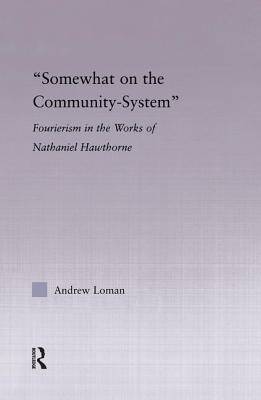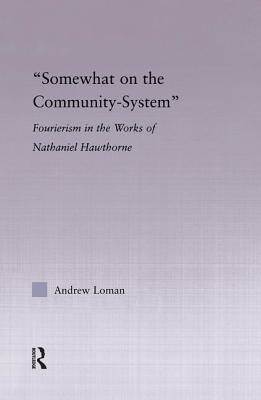
Door een staking bij bpost kan je online bestelling op dit moment iets langer onderweg zijn dan voorzien. Dringend iets nodig? Onze winkels ontvangen jou met open armen!
- Afhalen na 1 uur in een winkel met voorraad
- Gratis thuislevering in België vanaf € 30
- Ruim aanbod met 7 miljoen producten
Door een staking bij bpost kan je online bestelling op dit moment iets langer onderweg zijn dan voorzien. Dringend iets nodig? Onze winkels ontvangen jou met open armen!
- Afhalen na 1 uur in een winkel met voorraad
- Gratis thuislevering in België vanaf € 30
- Ruim aanbod met 7 miljoen producten
Zoeken
Somewhat on the Community System
Representations of Fourierism in the Works of Nathaniel Hawthorne
Andrew Loman
€ 64,95
+ 129 punten
Uitvoering
Omschrijving
Hawthorne wrote much of his major fiction in the decade that the theories of Charles Marie François Fourier crossed the Atlantic and contributed to a wave of communitarian experimentation in the American North. Famously, Hawthorne briefly lived and worked at Brook Farm, a Transcendentalist commune that formally converted to Fourierism when he had left and was embroiled in litigation to recover money he had invested in the community. In his fiction, Hawthorne responded directly to Fourierism and its critique of capitalism. He used his experiences at Brook Farm as the inspiration for The Blithedale Romance, and in The House of the Seven Gables cast one of the principal characters as a recovering Fourierist. In The Scarlet Letter he engaged with Fourierist debates on marriage and the regulation of desire. Somewhat on the Community-System examines these interventions, and argues that Hawthorne's fiction both seeks to contain Fourierism and responds to its allure. Moreover, in formulating alternative, morally acceptable utopias (ones that are predicated on middle-class marriage), Hawthorne's fiction appropriates key aspects of Fourierist theory
Specificaties
Betrokkenen
- Auteur(s):
- Uitgeverij:
Inhoud
- Aantal bladzijden:
- 184
- Taal:
- Engels
- Reeks:
Eigenschappen
- Productcode (EAN):
- 9781138868663
- Verschijningsdatum:
- 8/06/2015
- Uitvoering:
- Paperback
- Formaat:
- Trade paperback (VS)
- Afmetingen:
- 152 mm x 229 mm
- Gewicht:
- 340 g

Alleen bij Standaard Boekhandel
+ 129 punten op je klantenkaart van Standaard Boekhandel
Beoordelingen
We publiceren alleen reviews die voldoen aan de voorwaarden voor reviews. Bekijk onze voorwaarden voor reviews.











